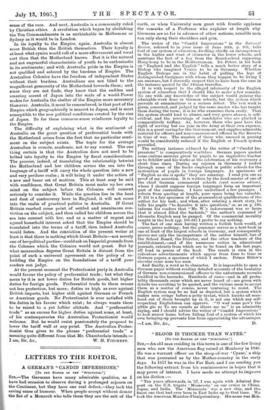A GERMAN'S "CANDID IMPRESSIONS."
SIE,—The Germans have many admirable qualities, as I have had occasion to observe during a prolonged sojourn on the Continent, but they have one real defect,—they lack the saving sense of humour. When people accept without demur the fiat of a Monarch who tells them they are the salt of the
Germans are so far in advance of other nations, sensible men can only shrug their shoulders and grin.
The writer of the "Candid Impressions" in the National Review, referred to in your issue of June 10th, P. 861, falls foul of our system of education, dwelling chiefly on incompetency in the higher and want of character in the lower schools, and mentions the fact of a boy from the Board-school supposing Hong-kong to be in the Mediterranean. Dr. Peters in his book on "England and the English" tells a much better story of a Bishop who imagined Venice to be in Germany. Whether English Bishops are in tho habit of pulling the legs of distinguished foreigners with whom they happen to be living I am unaware, but I shrewdly suspect this to have been the case in the instance quoted by the African traveller.
It is with respect to the alleged inferiority of the English system of education that I should like to make a few remarks. No one with any knowledge of the subject would gainsay the admirable work done in German schools, but the system which prevails at examinations is a serious defect. The test work is given, corrected, and judged by the same master who has taught them daring the term ; it is he who examines them orally. That the system should lead to abuses, and very grave abuses, is self- evident, and the percentage of candidates who aro plucked is comparatively trifling. As, however, those who pass have the right of serving but one year in the Army at their own expense, this is a great saving for the Government, and supplies admirable material for officers and non-commissioned officers in the Reserve in time of war. The number of those who succeed in passing would be considerably reduced if the English or French system prevailed.
The solitary instance adduced by the writer of "Candid Im- pressions" is comparatively worthless. German papers quoted some curious answers given by pupils to an inquisitive teacher as to Schiller and his works at the celebration of his centenary a short time since. During my sojourn in Germany I looked through some of the books employed in public schools for the instruction of pupils in foreign languages. As specimens of "English as she is spoke" they are amazing. I send you one as proof of my assertion. It is written by the head-master of one of the chief German commercial schools (sunt nornina odiosa), where I should suppose foreign languages form an important part of the curriculum. I have underlined a few passages. I refrain from quoting at length, your space being too valuable. P. 101 is a fair specimen of the grammatical qualifications of the author for his task ; and when, after relating a short story, he tells his pupils "to dessolve it into questions," or, as on p. 130, informs his readers that "Mr. W.'s indorsement was so large that it almost filled the backside," the author's command of idiomatic English may be gauged. Of the commercial morality taught in the book (pp. 181-83) I prefer to say nothing.
The fact of one man having written a foolish book would, of course, prove nothing; but the grammar serves as a text-book in one at least of the largest schools in Germany, and consequently proves not only the incompetence of the author himself, but of the School Board, the Director, and the other teachers of the establishment,—and of the numerous critics in educational journals, extracts from which are to be found on the last page, all loud in praise of the book. The result is seen in the ridiculous advertisements which appear from time to time in German papers, a specimen of which I enclose. Prince Billow's circular came none too soon.
And finally, a word as to character. It is impossible to open a German paper without reading detailed accounts of the brutality of German non-commissioned officers to the unfortunate recruits huddled in the barracks. Hundreds of cases—and in all proba- bility thousands occur which are never heard of—are given with details too revolting to be quoted, and the victims seem to accept them as a matter of course, never venturinc, to resist. The English system may be as bad as depicted, but a system which makes men cringe before a petty tyrant, which knocks all man- hood out of those brought up in it, is not one which any self- respecting Englishmen can approve. "0 wad some pow'r the giftie gie us To see oorsels as ithers see us" is an admirable saying, and I should advise the writer of "Candid Impressions" to look nearer home before falling foul of a system of which his own bringing-up prevents him from appreciating the advantages.
—I am, Sir, &c., D.






































 Previous page
Previous page